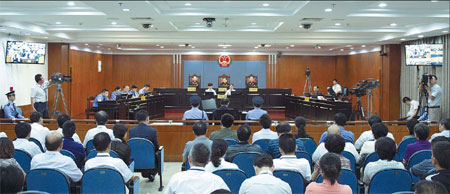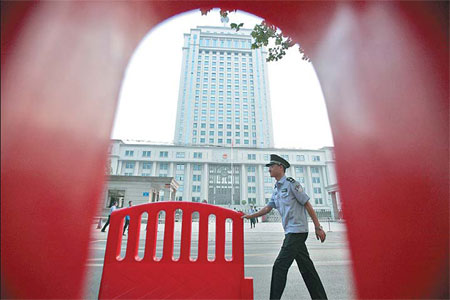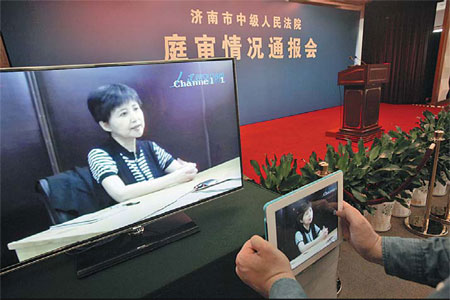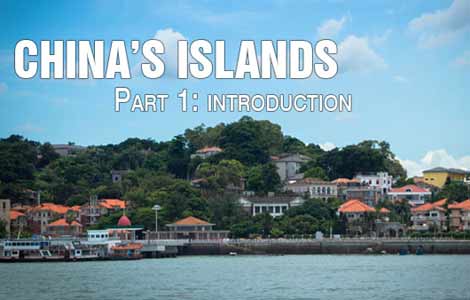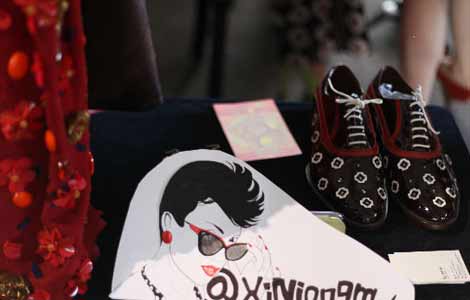Trial of Bo Xilai: evidence, charges and defense
Updated: 2013-08-29 07:26
By Xinhua (China Daily)
|
||||||||
|
The last day of the trial of Bo Xilai at Jinan Intermediate People's Court in Jinan, capital of East China's Shandong province. The trial of Bo, charged with bribery, embezzlement and abuse of power, concluded at 1:04 pm on Monday. The verdict will be announced at a date yet to be decided. Xie Huanchi / Xinhua |
|
Bo Xilai's trial was openly held at the Jinan Intermediate People's Court, Shandong province. Photos by Wang Jing / China Daily |
|
The court plays video recordings of Bogu Kailai to the media on Friday. |
The trial of Bo Xilai, charged with bribery, embezzlement and abuse of power, concluded on Monday at Jinan Intermediate People's Court, after hearings from Aug 22 to Aug 26.
The verdict will be announced at a date yet to be decided.
At the trial, prosecutors demanded a heavy sentence for Bo while the defendant denied the charges.
In his final statement, Bo said he made serious errors of judgement when handling the defection of Wang Lijun, former vice-mayor and police chief of Chongqing.
"Wang's defection caused vile impacts at home and abroad and undermined the image of the Party and country," he said. "I am deeply ashamed and filled with regret, but I did not intend to misuse my power."
He also denied the bribery and embezzlement charges against him. "The charges are not true. My mistake, which was serious, was that I did not discipline my family and subordinates.
"I know I am not a perfect person. I had a strong ego and bad temper. I made serious mistakes," he said. "I sincerely admit that my failure to manage my family had a negative effect on the country.
"I sincerely accept the investigation from the party and the judicial departments," he said.
Over the past 16 months, the staffers who took charge of his case took care of his life, he said.
"They talked with me in a civilized way and most of them were professional, though of course, I have been under pressure during the process," he said.
"During the trial, both prosecution and defense sides had opportunities to fully express their opinions. Also, the court released trial transcripts through micro blog. All of these have made me more confident of the future of China's judicial system," he said.
Bo's trial began on the morning of Aug 22 in the largest courtroom of Jinan Intermediate People's Court.
More than 100 people, including Bo's family and relatives, deputies to people's congresses, political advisors, citizens and journalists observed the trial.
The moment after Bo, escorted by marshals, walked into the defendant's seat, he stopped and turned around, casting a glance at the observers' seats.
Bo, 64, is former secretary of the Chongqing Municipal Committee of the Communist Party of China (CPC) and a former member of the CPC Central Committee Political Bureau.
Bo's resume also includes mayor and Party chief of Dalian in northeast China's Liaoning province, member of the Standing Committee of the CPC Liaoning Provincial Committee and deputy secretary, governor of Liaoning and minister of commerce.
On April 10, 2012, Bo was suspended from the CPC Central Committee Political Bureau and the CPC Central Committee, on suspicion of serious discipline violations and the Central Commission for Discipline Inspection of the CPC filed a case for investigation.
On Sept 28 last year, the CPC Central Committee expelled Bo from the CPC, removed him from public office and transferred his case to the judiciary.
On the same day, the Standing Committee of Chongqing Municipal People's Congress removed him from his post as deputy to the National People's Congress. The Supreme People's Procuratorate (SPP) opened an investigation and decided to arrest him.
The SPP passed the case to Jinan People's Procuratorate to prepare for prosecution on charges of bribery, embezzlement and abuse of power on April 10, 2013.
Jinan People's Procuratorate instituted a public prosecution against Bo on July 25 on the three charges.
The court investigation began when the presiding judge informed all parties of their litigation rights at 9:10 am on Aug 22.
Yang Zengsheng, vice-president of Jinan People's Procuratorate, and three others served as prosecutors in court. Yang read the indictment.
According to the indictment, Bo accepted bribes worth about 21.8 million yuan (about $3.5 million) directly or jointly with others.
"The amount was especially huge," the indictment said.
Bo was accused of conspiring to embezzle 5 million yuan of public funds."The sum was huge," the indictment said.
Bo abused his power, causing major losses to the interests of the State and people. The circumstances are especially serious, according to the indictment.
According to the prosecution, Bo's conduct violated Clause 1 of Article 385, Article 386, Clause 1 of Article 382, the first entry of Clause 1 and Clause 2 of Article 383, and Clause 1 of Article 397 of the Criminal Law of the People's Republic of China and he should be held criminally responsible for the three charges and be punished accordingly.
The prosecutors pointed out that the charges were filed on the basis of a large body of factual evidence.
During the trial, the defendant gave a statement on the facts regarding his alleged offenses and denied all charges.
Prosecutors and defense lawyers questioned the accused.
Witnesses Xu Ming, chairman of Dalian Shide Group Co Ltd, Wang Zhenggang, then director of the Dalian municipal bureau of urban and rural planning and land, and Wang Lijun, former vice-mayor of Chongqing, appeared to testify in court.
Both the prosecution and defense cross-examined the witnesses.
Prosecutors played video recordings of Bo's wife Bogu Kailai and Tang Xiaolin, general manager of Dalian International Development Co Ltd., and presented evidence including documents and audio-video materials, witness' testimony, and the confession and arguments of the defendant.
Prosecutors said the defendant failed to provide evidence that could help refute the facts regarding his charges and expressed numerous conflicting statements during his defense.
The court approved all applications by Bo and his lawyers to speak, guaranteeing them enough time to express their views.
During the trial, Bo expressed his gratitude to the presiding judge for being fair, saying the trial had proceeded in a humane and civilized manner.
When the investigation phase was complete, and with the consent of the presiding judge, the prosecution and defense debated the facts, evidence and charges.
Both sides expressed views on facts, evidence and law on which judgment of guilt and measurement of punishment would rely.
Jinan People's Procuratorate pointed out in its summary of the case that during the trial, Bo not only denied the evidence, but overturned his handwritten confession.
On the charge of abuse of power, Bo admitted mistakes and responsibility, but did not admit the charge and refused to plead guilty.
Prosecutors stressed that the facts of the crimes are objective and will not be altered by the defendant's own will. The facts are based on evidence, not the defendant's testimony.
Although the country's legal system has a principle of tempering justice with mercy, a heavy sentence in line with the law should be handed to Bo, as he committed very serious crimes and refused to plead guilty. Considering that the accused did not turn himself in or disclose another person's crimes, he is not subject to any terms of leniency by law," prosecutors said.
Suspected of taking bribes
Bo was charged with taking bribes based on the following evidence: from 1999 to 2006, Bo took advantage of his position to seek benefits for others; from 2000 to 2012, Bo accepted cash and property worth about 21.8 million yuan (about $3.5 million) from others, or through his wife Bogu Kailai (handled in a separate case) and his son Bo Guagua.
According to the indictment, from 2000 to 2002, at the request of Tang Xiaolin (handled in a separate case), general manager of Dalian International Development Co Ltd, Bo helped Tang's company take over the Dalian City liaison office in Shenzhen and then used the office's land for development projects. Bo also helped Tang obtain preferential quotas to import cars. Bo took advantage of his posts as mayor of Dalian, secretary of the Communist Party of China Dalian committee, and governor of Liaoning province in doing so. From the second half of 2002 to the second half of 2005, Bo three times accepted money offered by Tang, which totaled 1.1 million yuan.
Evidence presented by the prosecutors, including five verbal testimonies and four handwritten testimonies from Tang, video recordings of Tang collected on May 31, 2013, demonstrated how Tang showed his gratitude to Bo after he harvested profits through the land project in Shenzhen and imported cars.
The source of the bribes, the process of bribery and the use of the bribes have been corroborated by the testimonies of multiple witnesses and documentary evidence presented to the court.
Bo denied that Tang had bribed him, claiming that what Tang had asked of him was official business according to official principles.
In Bo's handwritten testimony he admitted that Tang had paid him a total of $130,000 and 50,000 yuan. Tang made the first payment to Bo in 2002 at Bo's home in Shenyang. Tang gave Bo $50,000. Bo's son was studying abroad and the money was to cover his living expenses. In 2004, when Bo was at the Ministry of Commerce, Tang bribed him again, this time with 50,000 yuan at his office, to "purchase some stationery." Bo took the money home. In 2005, Tang bribed Bo for the third time at Bo's office in Beijing with $80,000, saying that the money was for Bo's wife and son, again to cover living expenses abroad, and the money was to express an old friend's goodwill. The money was taken home by Bo and kept in a safe in his study.
Bo and his defense team asserted that his handwritten confession was contrary to Bo's convictions and untruthful. They said the confession should be excluded as illegal.
Bo claimed to have been under pressure when writing the confession, which should justify his demand to exclude it. According to prosecutors, Bo wrote the confession alone and nobody was present at the time.
Aside from the handwritten confession, the defendant had admitted accepting Tang Xiaolin's bribes in a verbal confession during the investigation. The defendant failed to give a reasonable cause to retract his testimony. Bo's defense was self-contradictory and his previous confessions should be tabled as evidence.
In response to Bo's claim of doing official business according to official principles, prosecutors said that anyone who made a profit in a power-for-money deal committed the crime of bribery, regardless of the legitimacy of the profits or whether the profits were reaped in official business.
According to the indictment, from 1999 to 2006, the defendant Bo Xilai, under the request of Xu Ming, chairman of Dalian Shide Group Co Ltd, took advantage of his position and granted Xu favors in some projects.
The favors included helping Xu with his company's acquisition of the Dalian Wanda Football Club, construction of a sightseeing hot air balloon in the shape of a football, a bid for the Shuangdaowan petrochemical project in Dalian, and being listed by the Ministry of Commerce as a private importer of crude oil and oil products.
From 2001 to 2012, Bo repeatedly accepted large sums of money from Xu Ming through his wife, Bogu Kailai, and his son, Bo Guagua.
The court's investigation showed that on July 9, 2001, Bogu Kailai, bought a villa in Nice of France worth over 2.3 million euros (16.25 million yuan; $3.1 million) with funds provided by Xu Ming.
Evidence presented by prosecutors showed a three-storey villa with a garden, swimming pool and garage, covering 3,950 square meters, the size of half a football field.
Evidence also showed that Bogu Kailai and her friend, French architect Patrick Devillers, carefully orchestrated a legally intricate purchasing plan where the villa was bought under the name of several companies rather than Bo's family.
The plan, called by Devillers a "montage", covered Bogu Kailai and her family's ownership of overseas real estate, and lowered transaction taxes and fees, through registering multiple companies overseas and taking advantage of their complicated shareholder mix.
Bo's wife explained in her testimony that she wanted to conceal the purchase of her overseas property, for fear of getting her family involved, or affecting Bo's political career.
The procuratorate, after combing through numerous pieces of written and verbal evidence, distilled a "roadmap" behind the "montage": Xu Ming's offer of funds, purchase of the villa under the name of companies, Bogu Kailai's real control over the villa, and Bo's knowing of the matter.
Xu Ming's testimony corroborated Bogu Kailai's testimony.
According to Xu, when Bogu Kailai told him she wanted to buy the villa, he immediately pledged funds.
Xu said, he made the offer to curry favor with Bogu Kailai and Bo so that Bo would return an even bigger favor in the future. Financial documents verified that Xu Ming was the provider of the funds.
Evidence showed that Bogu Kailai and her friends registered three companies overseas and involved at least four other foreign companies and one foreign bank in the purchase plan.
The first company they registered was owned 50/50 between Bogu Kailai and Devillers, to abide by local laws which required a company to start with at least two shareholders. However, Devillers' share was simply held by him in Bogu Kailai's place.
Devillers said in his written testimony that he did not invest anything in the company, and Bogu Kailai was the real shareholder.
Bogu Kailai repeatedly admitted, "the villa has all along been my asset, and I am the villa's owner."
Bo said he believed the massive evidence only proved his wife's acquisition of the villa, and denied having anything to do with the villa,claiming absolute ignorance of the property purchase in Nice.
Witness testimony showed that Bo was well aware of the purchase by Xu Ming for his family.
During the trial, prosecutors played video-audio materials recorded of Bogu Kailai, while she was questioned on Aug 10. A digital slideshow of the Villa Fontaine Saint Georges, made by Bogu herself and acquired from her home computer after prosecutors searched her house was also played in court.
Bogu Kailai said, "I took a lot of pictures of the villa after it was purchased. I designed two slideshows of the villa. The slideshow was accompanied by English poems and music, with pictures switched in every three seconds.
"I brought the slideshow back to my Shenyang home, and played it to Xu Ming when he was at my house. At the time, Guagua's dad (Bo) was home from work and we watched the slideshow together. Xu praised me by saying that I had a talent for this, and Guagua's dad joked by saying that I quite understood arts and I was an artist. I took the initiative to tell him that I let Xu purchase a house in France, as a safe investment, which will be given to Guagua, and by leasing the villa a stable income can be gained. When I said these words, Xu was there."
Xu Ming confirmed that he, Bo and Bogu Kailai had sat together in Bo's home watching the slideshow, and that Bogu clearly explained to Bo that she had asked Xu to buy the villa so that Bo Guagua would have a stable income.
Xu recalled, "Later, we chatted for a while before I left, but I cannot remember clearly what we said at the time. The whole story just happened like this."
Bogu Kailai said, "Bo Xilai asked me whether it was safe to do this. I assured Guagua's dad by telling him that the purchase was very complicated. [The villa] had not been purchased under our name. It was quite safe."
Prosecutors presented testimony from Xu Ming, which confirmed that Bo was aware of the purchase of the villa.
Xu's testimony states, "In July 2004, Bogu Kailai said the property purchase procedures had been completed and Bo Xilai would call me soon about the matter. Later, Bo himself called me and asked me to go to the Ministry of Commerce to find him. During our face-to-face talk, Bo said [the property] must be kept secret strictly, and he said 'he did not know anything about the property at any time.' I said I understood."
Bo said in court, "The evidence related to the property is like a huge ball, and only a thread on the ball can prove I had something to do with the villa. The thread refers to the scenario in which the slideshow was played in my Shenyang home. However, such a scenario did not take place, and the testimonies of Bogu Kailai and Xu Ming are false."
Prosecutors pointed out that, on one hand, Bo claimed that he was seeing the slideshow in court for the first time, but the other, he said he had a vague impression that he had seen it at his home: Bo alleges that Xu Ming was a friend of Bogu Kailai, but not his friend. He cannot explain why Xu owned a vehicle pass for the Ministry of Commerce.
During cross-examination, Bo did not deny basic details like "the three watching the slideshow together" and "setting up an alliance to keep the property secret at the commerce ministry," which was confirmed by Xu.
Bo's many allegations had nothing to do with the facts and evidence. The allegations were merely his explanation of facts, which cannot be proved as he cannot present any evidence. Bo's arguments were either self-contradictory or weak.
The defense lawyers questioned the legality of the evidence, the authenticity of witness testimonies, and the ownership of the property in France. Prosecutors responded to them one by one.
Dozens of financial reimbursement vouchers of the Dalian Shide Group collected by the prosecutors and several witnesses' testimonies showed that Bogu Kailai and Bo Guagua accepted benefits worth a total of 4,431,432 yuan from Xu Ming from 2004 to 2012.
Xu used the money to pay for domestic and international fights, accommodation, travel, credit card debts and buy Bo Guagua a Segway electric scooter. Bogu Kailai told Bo Xilai about Xu's payments.
Bogu Kailai testified that Bo Guagua had frequently traveled between China and abroad while he studied overseas, and the whole family of his teacher had come to Beijing. In addition, more than 40 of his foreign friends and classmates had traveled to Beijing. It was her idea to ask Xu Ming to pay all the flight and accommodation expenses. Xu readily agreed and arranged for his company staff to make the payments.
Zhang Xiaojun, a family aide of Bo who contacted Xu Ming's company staff to buy flight tickets, said in his written testimony that the tickets could be roughly categorized into three types: tickets for Bo Guagua to travel between China and his schools in Britain and the United States; tickets for Bo Guagua to go to Germany for World Cup football matches and Italy, Argentina, Cuba, France, Africa and other places for tourism; and tickets for Bo Guagua's friends, classmates and teacher.
Staff with the Dalian Shide Group testified that in August 2011, in accordance with Xu Ming's wishes, they paid for an Africa trip totaling $130,841 for Bo Guagua, family and friends.
Of the amount, $80,000 was to charter a round trip from Dubai to Kilimanjaro, and $50,841 was for hotel rooms and other expenditure in Africa. The payment was paid from Xu Ming's personal account.
A lot of evidence showed that from 2004 to the time before Bo was investigated, Bogu Kailai and Bo Guagua accepted flight tickets from Xu Ming 76 times.
During the hearing, Bo said he knew nothing about flight reimbursements and had nothing to do with the payments. He said Bogu Kailai and Bo Guagua had never mentioned the tickets to him.
Bo's lawyers said he was unaware of the details of the payments.
Prosecutors said the evidence could prove that Bo was not only aware of payments for Bo Guagua's expenses, but had clear knowledge of the nature of the power-for-money deal.
Bogu Kailai testified that Xu Ming helped her, Guagua and his friends pay for the tickets and other expenses, and Bo Xilai was aware of the financial dealings between her and Xu. She told Bo Xilai that Xu Ming was a reliable man and provided assistance for Bo Guagua's studies.
Bo said in his written confession that Xu Ming had provided a lot of assistance for Bo Guagua's studies, and for Bogu Kailai and for his family. The nature of such assistance was a special deal that "I helped him with rapid development and he helped me take care of my child."
Bogu Kailai testified that the reason Xu Ming satisfied all her requests was Bo's position.
The prosecutors pointed out that the marriage between Bo and Bogu Kailai meant a community of interests, in which a bribe-taking pattern was formed by the husband helping trustees by using political power and the wife accepting the trustees' money.
With this pattern, the prosecutors said, whether Bo was aware of the general or detailed information of his wife's dealings, whether Bo was aware beforehand or afterwards, it did not change the facts that Bo and his wife committed a common crime of bribery.
Alleged embezzlement
Prosecutors claim that Bo, while secretary of the Dalian Municipal Committee of the CPC in 2000, was directly responsible for a confidential project to rebuild a venue. The project was undertaken by Wang Zhenggang, then director of the Dalian municipal bureau of urban and rural planning and land.
According to prosecutors, in 2002 after the project was completed, five million yuan was paid to Dalian's municipal government. Wang Zhenggang consulted Bo, who had already been transferred to the post of governor of Liaoning province, on how to manage the fund since it could not be conveniently entered into the official account due to the project's confidential nature.
In his court testimony, Wang Zhenggang said, "Bo said he needed some time to answer me when I asked the first time. One week later, I went to Shenyang to meet Bo again. I thought nobody in Dalian knew about the project and the money might as well be given to Bo for family expenses as a token of my gratitude for his promoting me. When I met Bo, I told him this idea, and Bo thought briefly and said, 'Do it then. Go to Bogu Kailai for details.' He also phoned Bogu Kailai."
Bogu Kailai confirmed that "during Bo's tenure as the governor of Liaoning, one day he told me 'Wang Zhenggang wanted to meet you.' I asked him why, and Bo said, 'Wasn't your law office closed? Haven't you always blamed me? Wang Zhenggang can help you with some money. A large amount.' Bo told me to contact Wang Zhenggang directly, and I immediately understood the situation. When my law office was closed, I was with Guagua in Britain and had been spending a lot. I had very little money, and Guagua's dad knew it perfectly."
Transcripts show that when investigators asked Bogu Kailai what Bo Xilai's "help you" meant, she answered "Guagua's dad and I always understood each other without speaking many words, and we didn't talk very literally. Wang Zhenggang had some money to give Bo and me, and we were perfectly clear about that."
Testimonies from multiple witnesses and the transfer records of multiple banks obtained by the prosecutors show the five million yuan allocated as project funds was entirely transferred into the account provided by Bogu Kailai between May 2002 and March 2005.
Testimony by Bogu Kailai read, "When the thing was completed, I told Bo Xilai how it was managed. It's all done. The money from Wang Zhenggang was received."
Prosecutors asked Bo whether Wang Zhenggang reported to him on the project, whether Wang reported to him the department which allocated five million yuan, and whether Wang suggested using the fund to cover Bo's family expenses.
Bo said he did not remember clearly.
"My impression about it is vague now. When the organization (CPC disciplinary authority) investigated me, they mentioned it, but in fact I have no memory of the issue," said Bo. "I cannot remember, but when investigators prompted me, I vaguely recalled the issue."
Bo also said Wang Zhenggang's testimony was illogical and not credible.
The prosecutors pointed out that after the allocation of the five million yuan, Wang Zhenggang suggested using the fund to cover Bo's family expenses.
Bo immediately asked Wang to consult with Bogu Kailai, and made a phone call to her to that effect. Those facts were corroborated by both Wang Zhenggang's court testimony and Bogu Kailai's written testimony.
Bo's testimony written on April 2 of 2013 said, "I agreed that Wang Zhenggang would talk with Bogu Kailai, allowing the arrangement. I did not follow the issue after Wang and Bogu Kailai discussed it, so I did not interfere. The fund entered my wife's account, taking public funds for private use. During the process, Wang Zhenggang met me, then I called Kailai again. I am willing to accept the findings of the investigation that the procuratorate authority confirmed after analysis. In the meantime, I bear legal responsibility for it. I am very ashamed and regretful about it."
Bo said the handwritten testimony was a self-criticism as if it were a matter of major principle, which was made under extreme pressure. Bo insisted that he had no intent to embezzle the money, saying, "what I regretted was that I was too careless and I did not check them well."
Bo and his lawyers said the charge of embezzlement was mainly based on Wang Zhenggang's testimony. However, judging from the evidence of the entire case, it can be proved that Wang did not meet the defendant, nor did Wang mention the issue of the five million project fund.
Prosecutors said that as for the key fact, although the defendant explained he had no intent to embezzle the money, the testimony of witnesses coincided with each other and contradicted the defendant.
Not only Wang Zhenggang and Bogu Kailai's testimonies, but also the verbal evidence of witness who helped transfer the money, the accounts of the company transferring the money, and bank account records, corroborate each other. The entire process of the five million yuan fund that went into the pocket of Bo's family was clear, coherent and complete. The evidence is solid and sufficient.
Suspected of power abuse
In January and February 2012, a series of incidents occurred in Chongqing. Bogu Kailai was suspected of the murder of British citizen Neil Heywood. Wang Lijun was removed from his post as the police chief of Chongqing and later fled to the US consulate in Chengdu, in a defection attempt.
At the time, Bo was a member of the Political Bureau of the CPC Central Committee and secretary of CPC Chongqing Municipal Committee. So what was Bo's involvement with these incidents? (According to the indictment, Bo "violated rules and executed a series of acts of power abuse."
On Jan 28, 2012, Wang reported to Bo on Bogu Kailai's suspicion of intentional homicide. The next day, Bo rebuked Wang for framing a murder accusation against Bogu Kailai, slapping Wang's face and smashing a cup.
While testifying in court, Wang Lijun recalled what happened. According to him, Bo smacked and scolded him. In doing so, Bo was employing violence to make a clear statement that Wang must stop investigating the murder case.
The testimony by Guo Weiguo, who was then the deputy police chief of Chongqing and was at the scene, corresponded with the account of Wang Lijun.
"Bo Xilai summoned me as well. Beating and rebuking Wang in front of my face, Bo was doing all he could to frighten me so that I would no longer talk of Bogu Kailai's suspicion of murder. To put it bluntly, Bo was using his power to prevent further police investigation of the murder case," according to Guo's testimony.
Court investigation found that the day Bo smacked Wang, at the request of Bogu Kailai, Bo approved investigation of Wang Zhi and Wang Pengfei, the two policemen who exposed the murder case on Wang Lijun's instruction. The two policemen investigated the murder case.
After the defection of Wang Lijun, on Bo's demand, Chongqing police interrogated Wang Pengfei and charged him with making false accusations and circumvention, the Organization Department of the CPC Chongqing Municipal Committee withdrew the nomination of Wang Pengfei as a candidate for a deputy head of Yubei District of Chongqing.
On the afternoon of Feb 1, 2012, Bo convened a Standing Committee meeting of the CPC Chongqing Municipal Committee, and sacked Wang. The removal was announced the next day on Bo's orders.
At the trial, Bo Xilai said,"I was not prudent and was at fault on this matter. It has long been held that I dismissed Wang Lijun as police chief post, but that is wrong. I just readjusted his duties, assigning him to oversee affairs of industry, commerce, education, technology. I definitely had no intention of demoting him."
The presiding judge then asked Bo whether he meant that he readjusted Wang's duties instead of sacking him as the police chief.
Bo replied,"I did dismiss Wang as police chief, but it was part of a process of reassignment."
According to rules set by the central authorities, local CPC committees must get permission from superior CPC departments of political and legal affairs in appointing or dismissing local law-enforcement officials.
The testimony by witnesses demonstrated that Bo insisted on breaking the rules and overstepped his authority by removing Wang Lijun, despite advice from several comrades.
According to Wang Lijun, Wang Zhi and Wang Pengfei, when Bogu Kailai's suspicion of murder was pointed out to him, Bo, as principal leader of Chongqing at the time, resorted to a series of acts to hinder the investigation of the murder case instead of reviewing it.
The court investigation found that after Wang Lijun defected on Feb. 6, 2012, Bo allowed his wife, who is not a civil servant, to take part in discussions about how to handle Wang's defection, and sanctioned her suggestion of asking a hospital to fake a diagnosis that Wang had mental illness.
On Feb 7, 2012, under the watch of Bogu Kailai and Wu Wenkang, a hospital in Chongqing issued a false certificate declaring Wang Lijun suffering from severe depression.
On Feb 8, 2012, Bo approved the release of the false news that Wang was receiving "vacation-style treatment".
The prosecutors said that these acts resulted in severe consequences and seriously undermined official credibility.
During cross-examination, Bo and his attorneys raised the issue that the witnesses, including Wang Lijun and Bogu Kailai, had major conflicts of interests with Bo, and questioned the objectivity and authenticity of their testimony. Bo also said that he had nothing to do with the acts of power abuse.
The prosecutors held that testimony by Wang was consistent with the testimony he gave prior to the trial and could be verified by testimony from other witnesses and documentary evidence.
Wang's testimony was real and reliable, the prosecutors said.
According to the prosecutors, pieces of evidence demonstrate that as a civil servant, Bo overstepped his authority and misused his power, a major reason for the delay to investigation of Bogu Kailai's murder case and Wang Lijun's defection, which led to severe social impacts and colossal damage to the interests of the nation and the people.
In this regard, the circumstances of the case are especially serious, its facts are clear and its evidence sufficient and reliable.
Bo's deeds accord with the constitutive requirements of the crime of power abuse as stipulated by China's criminal law.
Before and after trial
A courtroom debate between the prosecution and the defense was held on the morning of Aug 26.
Around 11 am, Li Guifang and Wang Zhaofeng of the Beijing-based DeHeng Law Offices, chosen by Bo himself to represent him, presented the defense summary.
"The defendant told us that he relied on us, trusted us, and believed in our professional loyalty and professional capability before the hearing," one of the two lawyers said.
Li Guifang offered an interview with Xinhua inside the court when Bo's trial concluded.
He said that before the trial, the defense attorneys had read all case files, copied relevant evidence, and paid Bo more than 20 visits, during which they fully exchanged views on defense strategies.
During the trial, the defense focused on the three charges and litigation procedures, especially facts the defense considered ambiguous and evidence that they thought not solid, Li said.
"We have fully expressed our views based on facts and laws," he said. "We believe the court can give a fair ruling in accordance with the law after fully considering views of the defense."
Sources told Xinhua that investigators in charge of the case looked into a total of 97 individuals with connection to or information about the case and got a lot of evidence. They also informed Bo of the right to hire lawyers.
During the case review and prosecution stage, prosecutors interrogated the defendant, not only trying to get the confession but also to study and verify his explanations according to law.
They informed the defendant of his litigation rights and assigned people to assist defense lawyers when they wanted to access case files.
Jinan People's Procuratorate instituted a public prosecution against Bo on July 25 with the three charges of bribery, embezzlement and abuse of power.
Assigned by the Supreme People's Court, the Jinan Intermediate People's Court formed a collegial panel, delivered a copy of the indictment to the defendant in time and informed the latter his litigation rights.
On Aug 14, the collegial panel convened a pretrial conference, which was attended by the defendant, his lawyers and the prosecutors, to hear opinions from both the prosecution and the defense on the evidence, witnesses and other judicial procedures for the trial.
On Aug 18, the court announced the date and location of the trial and delivered a summons as well as notice of appearance to the defendant and his lawyers.
"This is my first time sitting in the public gallery to hear the trial of a high-ranking official, which let me learn lots of the details of the case," said Kong Xiangying, a resident in Tianqiao district, Jinan.
"Bo Xilai once was a senior Party official, but everybody is equal before the law. I believe the court will surely give a fair ruling," Kong said.
(China Daily USA 08/29/2013 page8)
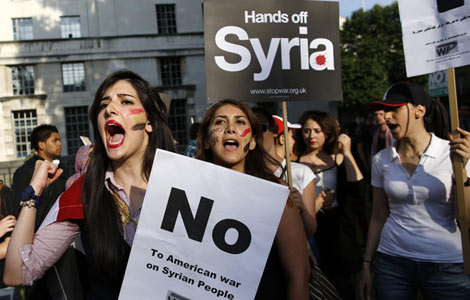
 US vows action in Syria even without UN backing
US vows action in Syria even without UN backing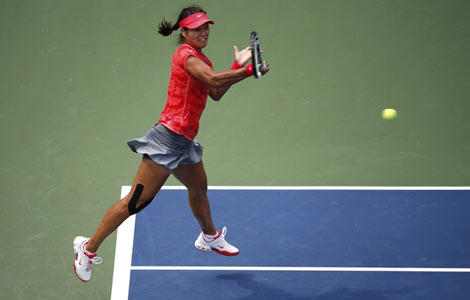
 Li Na advances to 3rd round
Li Na advances to 3rd round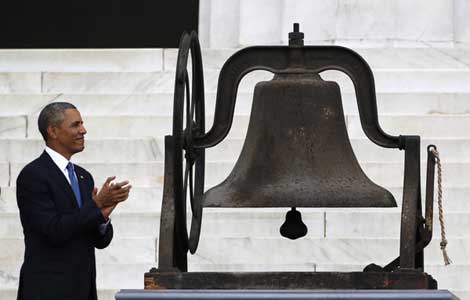
 Obama, marchers mark 50 yrs since King's speech
Obama, marchers mark 50 yrs since King's speech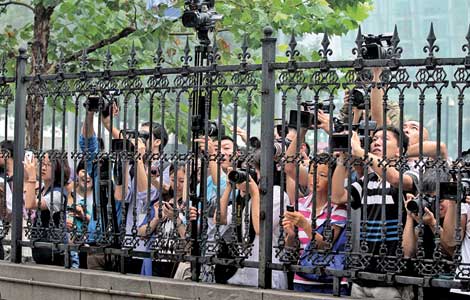
 Singers' son pleads not guilty
Singers' son pleads not guilty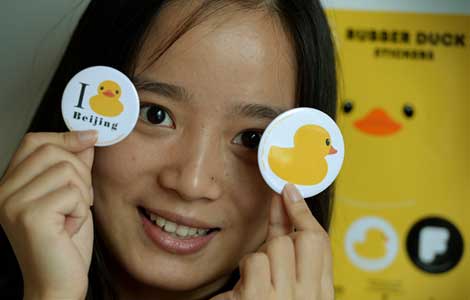
 Rubber duck to float in Beijing
Rubber duck to float in Beijing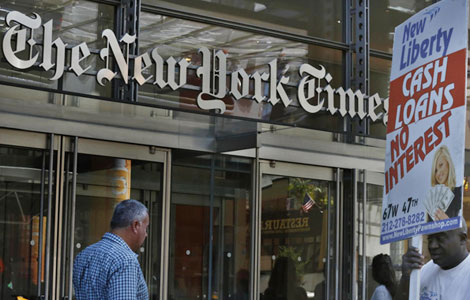
 New York Times, Twitter hacked by Syrian group
New York Times, Twitter hacked by Syrian group
 Five apps to help you 'breathe' in Beijing
Five apps to help you 'breathe' in Beijing
 Wozniacki survives battle with Chinese qualifier
Wozniacki survives battle with Chinese qualifier
Most Viewed
Editor's Picks

|

|

|

|

|

|
Today's Top News
China, US officials discuss defense ties
Envoy to seek release of US citizen
China leads the way on multilateral defense co-op
Bond trial program set to expand
China set to lead e-commerce market
US vows action in Syria
Firms 'must foster' jobs abroad
5-yr work plan to fight graft unveiled
US Weekly

|

|
